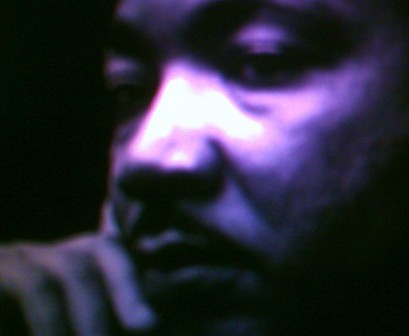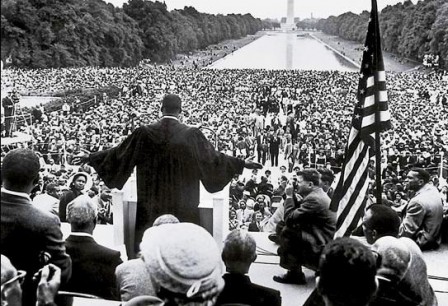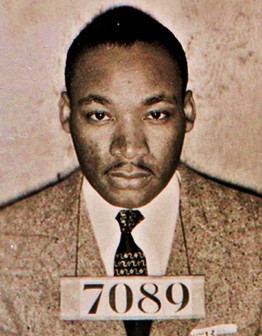Occupy: Expanding the Legacy of MLK and the Civil Rights Movement

NEWS JUNKIE POST
Jan 16, 2012 at 4:40 pm Almost half a century ago, Martin Luther King took on the herculean task to speak out and fight for the civil rights of America’s disenfranchised. Even so the accent of this struggle-starting in the early 1960s- was focused on putting an end to the odious state of segregation between whites and African-Americans prevalent in the Southern states of the United States, the dream of Dr. King went further. It concerned all people regardless of the color of their skins or gender. It was a dream of social justice for everyone, and an aspiration that, one day, all people would have not only equal rights but also equal opportunities to achieve their goals in life according to their abilities.
Almost half a century ago, Martin Luther King took on the herculean task to speak out and fight for the civil rights of America’s disenfranchised. Even so the accent of this struggle-starting in the early 1960s- was focused on putting an end to the odious state of segregation between whites and African-Americans prevalent in the Southern states of the United States, the dream of Dr. King went further. It concerned all people regardless of the color of their skins or gender. It was a dream of social justice for everyone, and an aspiration that, one day, all people would have not only equal rights but also equal opportunities to achieve their goals in life according to their abilities.
Before MKL launched the civil rights movement, America was,de facto, an Apartheid society, divided at its core. America was equal only officially, but in reality it was a divided and unequal social system where African-Americans were, at large, second class citizens. The message of Martin Luther King and his leadership within the Civil Rights movement were, in essence, revolutionary. But MLK wanted this deep, and much needed, transformation of the United States social structure to be strictly non-violent. MLK’s peaceful revolution of the 1960s changed America forever, allowing for example the election of a black President in 2008, but in many ways the achievements and gains which were made by the civil rights movement have been reversed. At large, African-Americans and Latinos are still getting the crumbs from the table. Even if it is more settled than before the time of MLK, American cities are still segregated by racial and socio-economic divides. If you are an African-American man in America between the age of 18 to 30, the chance that you will or have been through the US penal system is, today, more than 30 percent. More than 62 percent of America’s juggernaut prison system’s population is either African-American or Latino.
 In many ways, it seems that half a century later, the victories of MLK and the civil rights movement were short lived. With a public education system in shamble, the opportunities for the poor and minorities to advance and better their lives are melting away like snow under a bright sun. In term of wealth and income inequality, the gap between the 1 percent and the 99 percent has increased many folds since the late 1960s, not decreased. MLK tried to give a voice to the oppressed, the people who were forgotten by the so called American dream. But today, the voiceless are still not heard and they are certainly not invited to have a seat at the same table than the powerful. Even so, the racial divide is more defuse, the class one is more extreme.
In many ways, it seems that half a century later, the victories of MLK and the civil rights movement were short lived. With a public education system in shamble, the opportunities for the poor and minorities to advance and better their lives are melting away like snow under a bright sun. In term of wealth and income inequality, the gap between the 1 percent and the 99 percent has increased many folds since the late 1960s, not decreased. MLK tried to give a voice to the oppressed, the people who were forgotten by the so called American dream. But today, the voiceless are still not heard and they are certainly not invited to have a seat at the same table than the powerful. Even so, the racial divide is more defuse, the class one is more extreme.
 However, since the last few months of 2011, this sad state of affairs has taken a turn in the form of the birth of the US Occupy movement. Occupy draws a lot of its thematic and inspirations from the teaching of Dr. King. From the accent on non-violent protest, its oppositions to war and American imperialism, and especially its goal to redefine a society based on the principles of equality, fairness, sustainability and social justice. Martin Luther King knew all along that he had a target on his back, but the advantage of Occupy, in comparison with the civil rights movement, is that it is a horizontal movement with no clear define leadership. If MLK became a clear and easy mark for the one opposed to social changes in 1968, a leaderless movement like Occupy is, on the other hand, impossible to kill. If a man can be killed, principles or ideas cannot.
However, since the last few months of 2011, this sad state of affairs has taken a turn in the form of the birth of the US Occupy movement. Occupy draws a lot of its thematic and inspirations from the teaching of Dr. King. From the accent on non-violent protest, its oppositions to war and American imperialism, and especially its goal to redefine a society based on the principles of equality, fairness, sustainability and social justice. Martin Luther King knew all along that he had a target on his back, but the advantage of Occupy, in comparison with the civil rights movement, is that it is a horizontal movement with no clear define leadership. If MLK became a clear and easy mark for the one opposed to social changes in 1968, a leaderless movement like Occupy is, on the other hand, impossible to kill. If a man can be killed, principles or ideas cannot.
Related Articles
- January 20, 2013 Obama: No MLK, But Leading Man of Humanitarian Imperialism
- November 5, 2012 Occupy Sandy Should Not Act as an NGO to Replace Bad Governance
- April 14, 2012 Will America’s Moral Bankruptcy Cause its First Real Revolution?
- January 18, 2010 Obama Must Combine The Intellect Of MLK & The Fighting Spirit Of Ali
- November 5, 2013 The So-Called American Dream Has Become a Nightmare
- January 9, 2012 Occupy: A First Step Towards a Revolution of Our Collective Consciousness












You must be logged in to post a comment Login